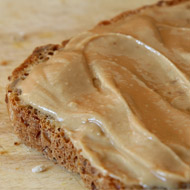RSPCA issues xylitol warning to pet owners

Xylitol is found in some brands of peanut butter.
The RSPCA has issued a warning to pet owners to avoid giving their pets Xylitol, which is often found in sweet treats and some brands of peanut butter.
Xylitol is a sweeter that is low in calories and used as a substitute for sugar. It is also known as E967 and often used in baking.
While many brands of peanut butter do not include this ingredient, the RSPCA is urging pet owners to check the label before allowing their dogs to have a taste. Xylitol can also be found in chewing gum, including nicotine gums and those that are sugar-free.
Last year, the RSPCA took 1,152 calls regarding animals that may have been poisoned and a further 97 asking for advice about poisons. This is a rise on the 2016 figures, which were were 1,225 and 110, respectively.
RSPCA behaviour and welfare expert Alice Potter said that some owners could be harming their pets without realising.
“You might think saving a bite of cake for your dog is harmless but actually you could be feeding them something toxic,” she said.
“What is ok for you to eat may not be ok for your dog or cat. Some of the more common foods like onions or chocolate many pet owners are aware of but we are receiving too many calls about poisonings so we need to raise awareness about the dangers of this artificial sweetener.”



 The Veterinary Medicines Directorate (VMD) is inviting applications from veterinary students to attend a one-week extramural studies (EMS) placement in July 2026.
The Veterinary Medicines Directorate (VMD) is inviting applications from veterinary students to attend a one-week extramural studies (EMS) placement in July 2026.